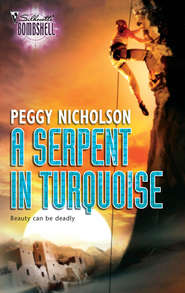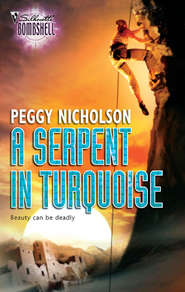По всем вопросам обращайтесь на: info@litportal.ru
(©) 2003-2024.
✖
More Than A Cowboy
Автор
Год написания книги
2019
Настройки чтения
Размер шрифта
Высота строк
Поля
“So when the owners run out of options, they dump the animal in some forest and try to tell themselves a cat that’s lived all its life in a cage or indoors will learn how to hunt before it starves. Or if they’re responsible, they put the poor beast down. Or suddenly the wife is wearing a fancy coat and a sheepish grin. But any way you cut it, there’s no happy ending. Which brings me to you.”
Tess jumped as the vet swung to aim an accusing finger at her.
“Assuming she lives, what do you mean to do with her?”
“I…haven’t thought it out, very far. This wasn’t something I planned. Zelda just happened.”
“Start thinking.”
“Well…I live on a ranch north of Trueheart, Colorado. At least, that’s where I’ll be living this summer, while I finish writing my dissertation. I suppose I figured I could free her there, maybe, and set up a feeding station outside. And hope that eventually she learns to hunt.”
Though she’d have to do this secretly. The cattlemen of Colorado were up in arms about the recent reintroduction of lynx to the San Juan Mountains. Tess’s father had been one of the main financiers of the lawsuits that had tried and failed to block the Division of Wildlife from bringing the animals back to the state. And when Ben Tankersly drew a line in the sand, his ranch manager and all his cowboys stepped up and toed it, if they valued their jobs. So Zelda would find no welcome at Suntop.
“Well, Problem One. If you’re talking about one of those suburban excuses for a ranch—a ten-acre ranchette—forget it. Lynx are territorial, but they need a range of five to a hundred square miles. You’ve got a female, so figure on the smaller side of that, but all the same. Have you got that kind of room?”
“More than enough.” Suntop was larger than Ted Turner’s ranch, larger than Forbes’s. Back in the 1890s, Tess’s great-great-grandfather had carved his vast spread out of the foothills of the San Juans, and Tankerslys had guarded it jealously ever since. Now Ben ruled there, king of his own small kingdom.
“I live at Suntop,” Tess admitted. When pressed to say anything at all, she generally put it like that. Strangers tended to assume she worked on the ranch rather than that she was a member of the family. She hated the way people looked at her when they learned she was a Tankersly. As if they were calculating her worth to the penny. And once they started adding it up, she was too proud to explain that she might be land rich, but she was cash poor. And likely would always remain so, if she wanted to live life her way.
So it was best just to disclaim or downplay all connection with Suntop, whenever possible.
“Suntop!” Liza Waltz let out a long, low whistle.
“Yeah, that should be room enough, but here’s Problem Two. Lynx hunt at six thousand to nine thousand feet. Is the ranch that high?”
“Not the home range,” Tess admitted. “But the summer grazing, up in the high country, borders on that kind of elevation. Then north of that is all national forest, the San Juans, hundreds and hundreds of square miles of wilderness, going up and up.”
“That would do. That’s not far from the area the Division of Wildlife chose for its lynx restoration program. Which brings me to another point.” The vet paused for a minute while she set up an IV bag on a pole, then taped Zelda’s left forepaw to an immobilization board. “You’re sure Hazeltine purchased her from a fur farm?”
“Yes. I insisted he give me all her papers, and they prove it.”
Liza grunted as she inserted the needle in a vein, nodded in satisfaction, then hooked up the tubing. “I’ll need to check those. The reason I ask is, if by any chance Hazeltine lied—if he trapped himself one of the Colorado DOW’s lynx—we’ve got to hand her over. They’re protected by the Endangered Species Act, state and federal, and believe me, we don’t want to mess with those guys!”
“No, but I’m certain her papers are in order.”
“I’ll have to call that fur farm to confirm it, because the DOW’s imported one hundred twenty-nine lynx into Colorado over the past four years, and do you know how many of them are left?”
“I haven’t really followed it lately. I know the program hasn’t gone as well as they’d hoped.”
Liza snorted. “The numbers have dwindled down to forty-seven cats, which can still be tracked by their radio collars. If Zelda isn’t one of the missing lynx, then where the heck are they?”
BY THE TIME Gabe returned with their take-out supper, Adam had managed to gimp his way to the picnic table on the screen porch. The evening breeze was mild for April, but not cool enough to dry the sweat he’d broken getting on his feet. He wiped a wrist across his forehead and called, “I’m out here,” when Gabe came through the kitchen door bearing grease-spattered brown paper bags.
“Geez, I turn my back for ten minutes and you’re out of bed!”
“Barbecue ribs and clean sheets are an ugly mix. Besides which, I was bored.” When Adam had insisted on signing himself out against his doctor’s advice, Gabe had decided to extend his visit and see him settled at home. But three days of devoted nursing and nagging was getting on both men’s nerves. It was just as well Gabe was headed back to Colorado tomorrow.
Adam sighed at the thought. “Wish I was headed west. Spring skiing, instead of swatting mosquitoes.”
“Then come with me,” Gabe suggested, as he tossed napkins and a bottle opener on the table. He ducked back into Adam’s pocket kitchen for plates and silverware. “Plenty of room at the home ranch, and you know Mom would love to pamper you. Since the twins went off to college, she’s got too much time on her hands. She’s been wallpapering everything but the border collies, and bugging Dad to take tango lessons. A mission to whip you back into shape is just what she needs.”
Adam grinned, shook his head and, popping a cap off a Negra Modelo beer, handed it over. “Thanks, but no thanks. Connie’s overwhelming enough when a man can run, but right now, while I’m feeble… First thing your mother would do, is start matchmaking.”
Gabe clinked his bottle against Adam’s in a rueful salute. “Too true. She couldn’t believe, when I called them yesterday, that you don’t have a steady girlfriend to take over once I’m gone.” His voice rose an octave and turned fretful. “A pussycat like Adam? Are those Louisiana women all blind and crazy?”
“Plenty of foxes in these woods, but they’re all marriage-minded, even the ones who swear they aren’t. So me, I’m taking a much-deserved sabbatical. Sleep this month, chase women later.” Adam took another swallow of beer. “Unless you still want help with your missing lynx problem?” Gabe hadn’t said a word about it after his first visit to the hospital.
His cousin’s brows drew together above a sticky red curve of sparerib. He set the bone aside to wipe sauce off his mouth. “I’m thinking maybe I was a bit hasty, suggesting that. Seems like you’re going to need a long, relaxing recuperation, and we’re racing the clock here.”
“They’re disappearing that fast?”
“Roughly four a month since January.”
They gnawed for a while in meditative silence till Adam said, “You sure you’ve got a problem? I mean, one of outside interference. You had more than average snowfall this year, didn’t you? So maybe they froze to death. Or they couldn’t find game in all that snow. You’ll find their bodies come snowmelt.”
Gabe shook his shaggy blond head. “They’re all wearing radio collars, which transmit to both satellites and planes, when we do flyovers. And each collar has a kill switch. If the animal stops moving for four hours or more, the collar sends out a death signal. Then we try to get somebody out there pronto, because sometimes not moving means the lynx is injured or trapped and we could help it.
“But of the cats that have vanished since January, all of their collars simply stopped sending. No live signal, no dead signal. Just…silence.”
Adam reached for the salt shaker. Reached an inch too far—a burst of sizzling fire streaked across his chest. He paused, blinking, then drew his hand back. Sat, testing each breath for a minute, then said casually, “Would you pick up the signal if the cat was down in a canyon, or holed up in a cave?”
Gabe lifted the shaker, used it, then set it down six inches closer to Adam. “You wouldn’t. The signal’s strictly line of sight. But when he came out, the satellite should pick him up again.”
“Well, maybe there was a cat convention at some point, in a cave. A St. Paddy’s Day blow-out or a Valentine howl-along? And an avalanche wiped out the whole tribe at once?”
Gabe grinned. “’Fraid not. Lynx are notoriously antisocial. They hunt and live alone. In mating season, March through early April, they keep company for maybe a week, but that’s it.”
“Except for mamas with kittens, I suppose.”
“Right, but since we haven’t had a single female deliver a litter in four years of hoping and waiting and praying, that isn’t an issue, either.”
“Hmm.” Adam served himself a second helping of potato salad. “What if they decided they missed Alaska or Canada or wherever they originally were snatched from and just started walking? ‘The cat came back,’ as the song goes.”
“Yeah, that was our first theory. A few from every group we’ve imported have gone walkabout, ending up in Utah, or New Mexico or even Nebraska. The males in particular can get restless. It isn’t unheard of for a tom to travel fifty miles or more a day for a week, though generally they do that in mating season, looking for ladies. But the satellite searches a wide band. If one of ’em made it to Las Vegas or Laramie, the collar signal would still beam up their location.”
“And it hasn’t,” Adam murmured to himself. “The case of the missing lynx. So…” He cocked a brow at his cousin. “Who’s got a grudge against these furballs?”
“Try the Cattlemen’s Association and every sheep-herder in the state, for starters.”
“Lynx kill cows? I didn’t think they were that big.”
“A big one tips the scales at forty pounds, and they’d eat nothing but snowshoe hares, if they had their druthers. When hares are scarce on the ground, they take pine squirrels or mice or the occasional ptarmigan. I guess a real bruiser might jump a sheep or two a winter, if he were desperate. But this isn’t like the wolf packs up in Yellowstone. You could drop a thousand lynx into cow country and never know the difference. They’re shy and elusive and they hunt by night. Short of some caterwauling in mating season, you’d never know they were there.”
“So why the fuss? I seem to remember some lawsuits, a few years back, trying to stop your program before it started.”
“Politics. In 2000, lynx were finally listed as threatened under the Endangered Species Act. And that means, whether the feds want to or not, they’re compelled by law to protect lynx habitat. And that’s where the rubber meets the road.
“The grazers fear that their grazing allotments will be taken away so the cats can hunt in peace. The loggers are scared that they won’t be able to cut trees in lynx territory. The Outfitters’ Association is worried they won’t be allowed to guide big-game hunters where the animals prowl.











